Browse By Unit
2.1 The Influence of Culture on Personal Identity
6 min read•june 18, 2024
Victoria Sokol
Isabela Padilha
Victoria Sokol
Isabela Padilha
Unit 2 Review
This unit plunges deeper into a few aspects of personal and public identity by analyzing the influences that language and culture have on forming one's identity. Our guiding questions for this unit are:
-
- How does one’s identity evolve over time? / ¿Cómo se desarrolla nuestra identidad a lo largo del tiempo?- How does language shape our cultural identity? / ¿Cómo moldea la lengua nuestra identidad cultural?- How does technology influence the development of personal and public identity? / ¿Cómo influye la tecnología en el desarrollo de la identidad pública y personal?- How does the art of a community reflect its public identify? / ¿Cómo refleja el arte de una comunidad su identidad pública?
2.1 Personal Identity
Some say the journey of self discovery and understanding is a lifelong adventure. Each person's personal identity can change over time.

Image from el autoestima en los adolecentes.
Self-Esteem
Self-esteem is the collection of all of the deep perceptions, images, thoughts 💭, and judgements 🧑⚖️ about ourselves. The three main components of self-esteem to consider are what you think, what you feel, and what you do. Know that self-esteem can change over time.
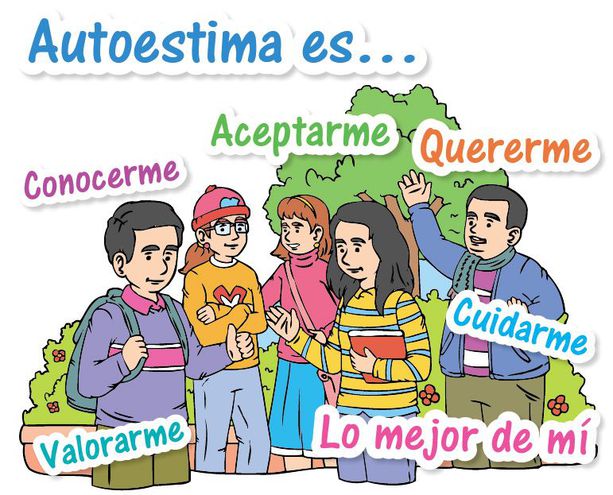
What can cause lower self-esteem? According to Reach Out, there are many causes.
Causes
| Palabra clave 🔑 | English | Descripción |
| padres que no animan | unsupportive parents | Las personas que tienen un papel de influencia son importantísimos en el desarrollo de la autoestima. |
| Los amigos que son malas influencias | friends who are bad influences | Los amigos son importantes en las experiencias que tienen los jóvenes. |
| Los eventos estresantes en la vida | stressful life events | Los eventos que resultan en estrés suman a tener muchos efectos. |
| La trauma o el abuso | trauma or abuse | Una vida llena de abuso o un evento traumático pueden bajar la autoestima. |
| El rendimiento pobre o metas impracticables | poor performance at school or unrealistic goals | En la escuela es bueno hacer metas, pero si son impracticables o inalcanzables, se siente peor. |
| Los trastornos del estado de ánimo | mood disorders | Los trastornos del estado de ánimo afectan la química del cuerpo y pueden mandar mensajes negativos al cerebro. |
| La ansiedad | anxiety | La ansiedad se caracteriza por sentimientos de inquietud e inseguridad. |
| El acoso o la soledad | bullying or loneliness | El acoso es un ejemplo de ataques físicos o mentales que a veces resultan en el sentimiento de soledad. |
| Los problemas médicas en desarrollo | ongoing medical issues | Otros tipos de problemas médicas tienen efectos en el cuerpo y pueden hacerse sentir diferente que lo normal. |
What are signs I could look out for so I can help? The largest sign of low self-esteem is repetitive negative thoughts about self worth or self value. If you see someone struggling with low self-esteem, offer kind words of encouragement that recognize what they are good at and build a positive relationship with them.
Beliefs 🤔 💭
The main religion in Latin America and Spain is Catholicism ✝️ There is a long history of Catholic beliefs in the Spanish-speaking world. This stems from European kings🤴 and queens 👸 imposing the Catholic religion upon their subjects for many, many centuries.
Most predominantly in Spanish-speaking history, Fernando II and Isabel I, los reyes católicos, united the kingdoms of Castilla and Aragón with their marriage 👩❤️👨 Ultimately, most of present day Spain came together under their rule. They have been titled the "Catholic Monarchs" in recognition of their enforcement and spread of the faith by Pope Alexander VI. In their conquest, they had little tolerance of other religions and drove many Jewish ✡️ and Muslim ☪️ people out of their realm. This deeply rooted ideology eventually spanned centuries and travelled across the ocean with the conquistadores who landed and conquered much of Central and South America. Under the orders of the Spanish kings🤴 and queen 👸 (and the Pope), Catholicism was imposed upon the indigenous people of the Americas with the same fervor and intolerance of indigenous beliefs or practices as the Jews and Muslims in Europe.
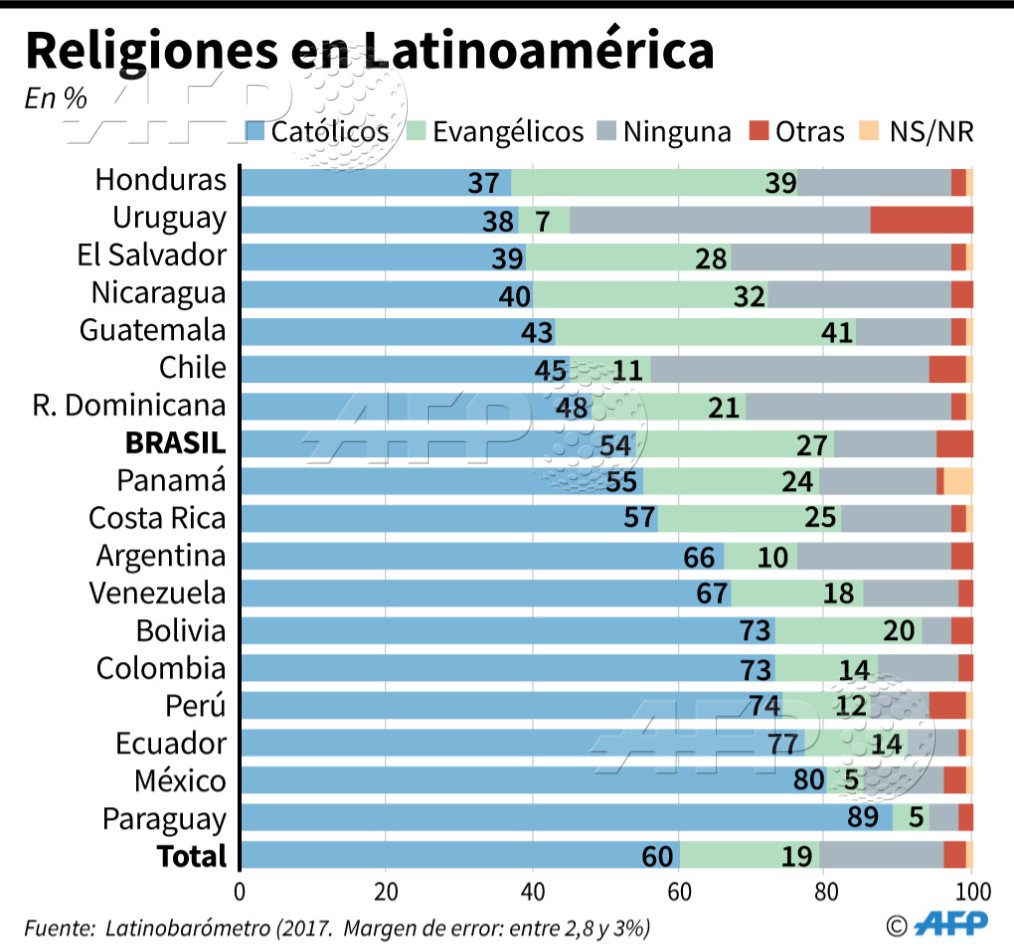
Nowadays in Latin America, a growing number of Catholic believers is decreasing each year. Some of this decrease is due to sweeping trends of equality movements and removing oppression.
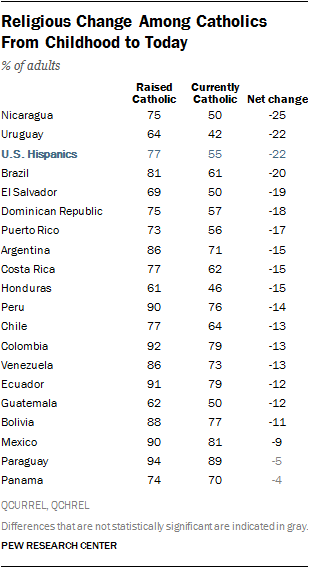
Image from Pew Research Center.
Nowadays in Spain, many people still claim to be Catholic ✝️, but do not actively practice the Catholic faith by going to mass. It is very difficult to remove centuries of ideology, history, and cultural monuments from a place, so Catholicism is still heavily present in national institutions.
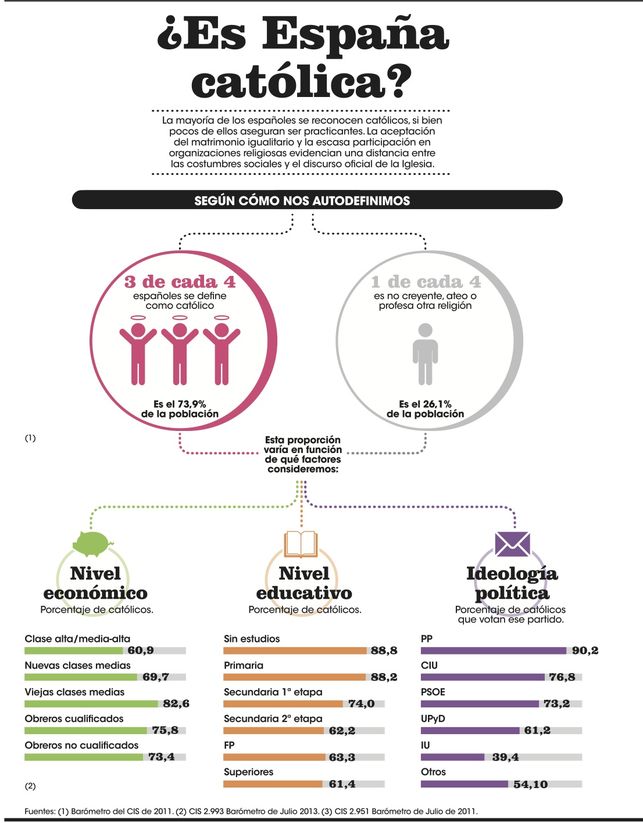
Apart from Catholicism, it is important to note a few of the folk religions that exist in the region of Latin America. While there are many religions practiced by smaller tribes of people in the Amazon Rainforest, there are two religions that have gained more popularity in recent years: La Santa Muerte and Santería.
La Santa Muerte, 👼 💀 tiene raíces en las comunidades indígenas desde el siglo XVIII. Hoy en día hay más de 10 millones de creyentes. Se considera como una ángel. Los creyentes traen ofrendas para intercambiar por su ayuda. En otras partes, ha subido en popularidad por los carteles narcotraficantes en México🇲🇽 quienes rezan por su protección. Esta religión tiene conexión con o una raíz en la fé católica por el uso de santos y algunos que antes practicaban catolicismo practican la Santa Muerte ahora por ser parecidas salvo que la Santa Muerte se acepta más sin discriminar como las normas católicas.
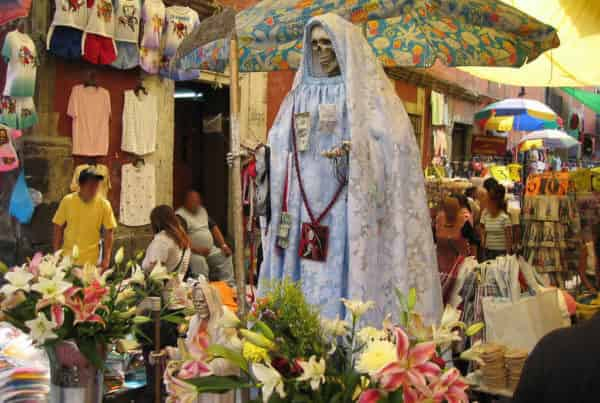
Santería tiene raíces afrocaribeñas y se considera una mezcla entre las tradiciones de Yoruba (de África) y Catolicismo. Se trajo a Cuba 🇨🇺 desde la África 🌍 durante el comercio de esclavos⛓️. Es una religión politeísta que enfoca más en ritos y prácticas como sacrificios de animales y ofrendas a los múltiples dioses. Para practicar esta religión, hay una ceremonia de iniciación de unos días, un toque de santo para invitar una posesión, curanderos que usan hierbas para sanar y consultas con un experto en adivinación.
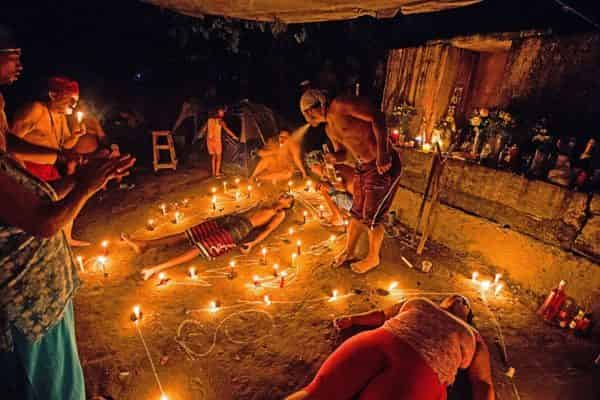
Vamos Practicar! - Task Model
Primeramente, mira el seguiente gráfico sobre la diversidad de idiomas en México:
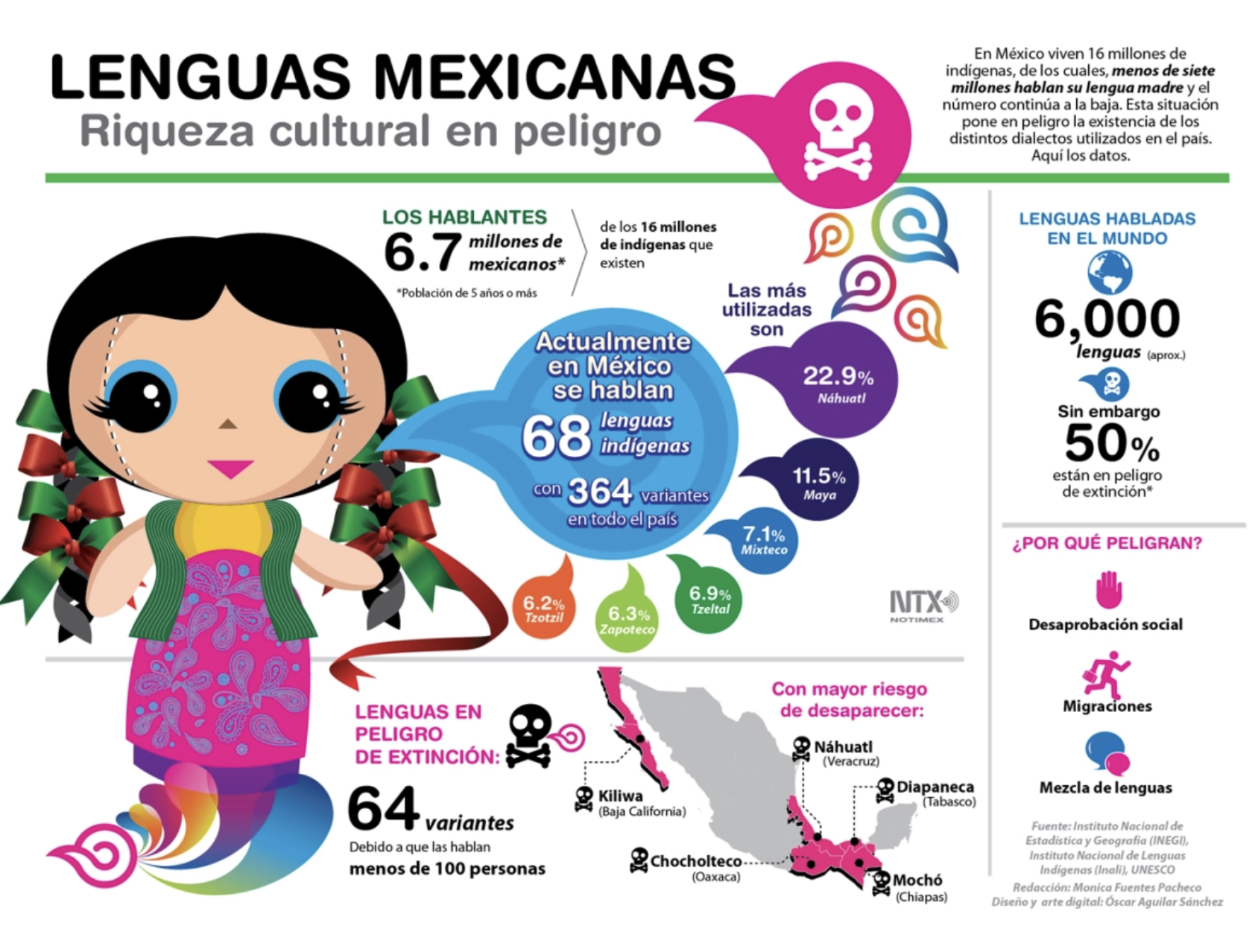
Intenta responder las seguiente preguntas:
-
What is the problem that this infographic points out?/¿Cual es el problema que señala este gráfico? Possible answer: Este gráfico señala que en México hay muchas lenguas indígenas que estan en peligro de extinción. Además de existiren diversas otras lenguas en México y en el resto del mundo, diversos fatores sociales discriminan ciertas lenguas hasta el punto de su extinción.
-
What is the purpose of this inforgraphic?/¿Cual es el propósito de este gráfico? Possible answer: El propósito del gráfico es crear conciencia sobre la discriminación de lenguas através de México. El gráfico también enfatiza como el país tiene una cultura rica y diversa que es mantenida a través de la lenguaje.
-
What are the most important pieces of information from this inforgraphic?/¿Cuales son las informaciones más importantes de este gráfico? Possible answer: Algunas informaciones se destacan en el diseño. Por ejemplo, el hecho que existen más de 6,000 lenguas diferentes en el mundo, pero 50% de estas están en peligro de extinción. Otro dato importante es el facto que se hablan 68 lenguas indíginas en México, lo que demuenstras el tamaño de la diversidad lingüística del país.
Proximo, lee este texto: Tania Meza Escorza, "Día de la Lengua materna: La riqueza del plurilinguismo."
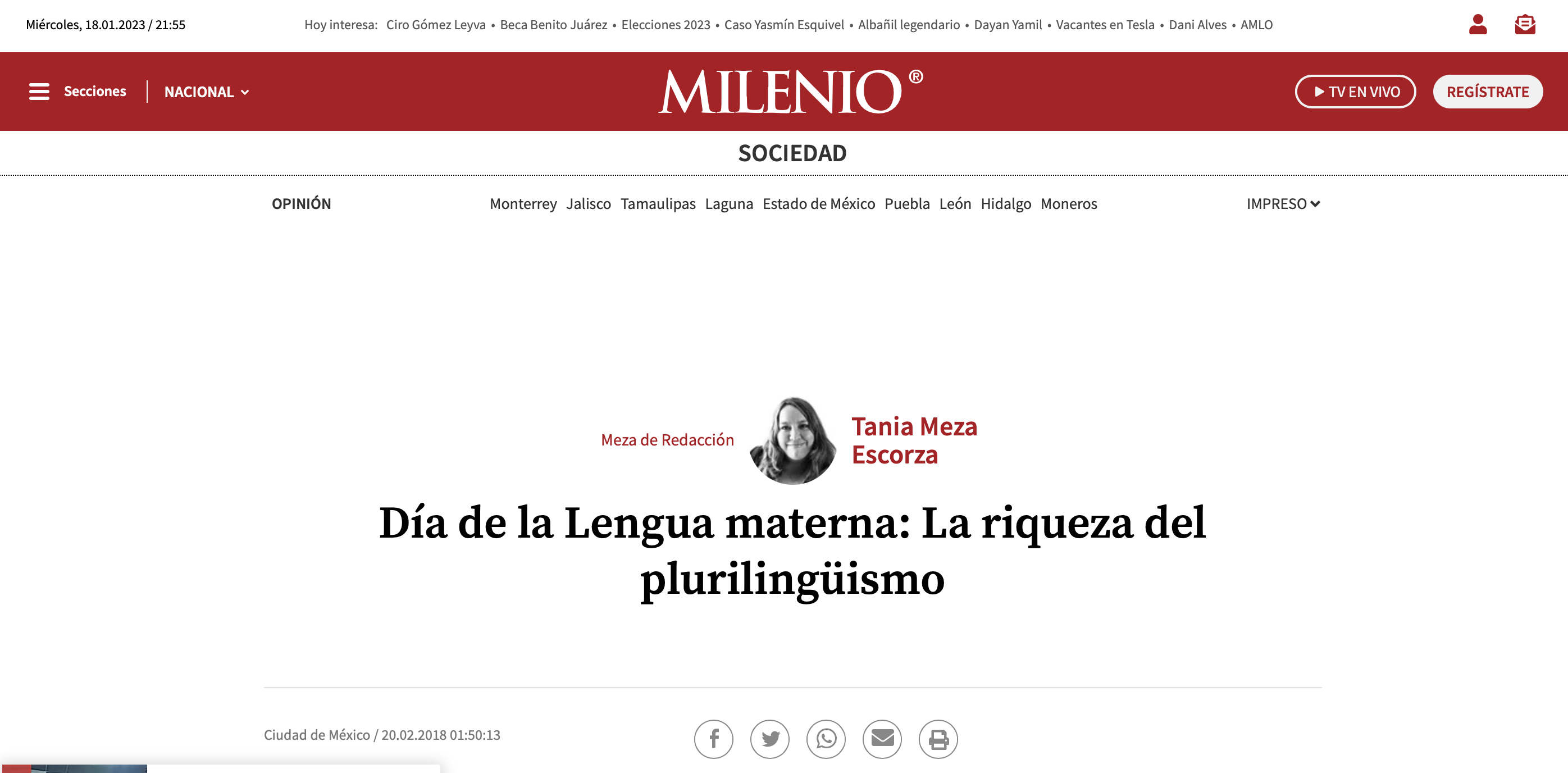
As you read the article, it is important that you retain important pieces of information because you need to be able to summarize it. In addition, you should be able to make connections between the material and the main theme of the unit.
Ejemplo de resúmen:
En este artículo por Tania Meza Escorza, la autora enfatiza la importancia del pluralismo linguistico. Ella empieza el texto refiréndose al día Internacional de la Lengua Materna. El 21 de Febrero fue establecido, por la UNESCO, el Día de la Lengua Materna con el propósito de mantener la diversidad linguística y proteger aquellos que hablan lenguas no dominantes en sus países. Además de esto, este día nos acuerda que nuestra lengua materna esta directamente conectada a el sentido de identidad. La autora refuerza que esto es especialmente importante para las minorías, como las mujeres y los pueblos indígenas y poblaciones rurales. De acuerdo con Tania, la lengua les ayuda a tener una voz en la sociedad.
<< Hide Menu
2.1 The Influence of Culture on Personal Identity
6 min read•june 18, 2024
Victoria Sokol
Isabela Padilha
Victoria Sokol
Isabela Padilha
Unit 2 Review
This unit plunges deeper into a few aspects of personal and public identity by analyzing the influences that language and culture have on forming one's identity. Our guiding questions for this unit are:
-
- How does one’s identity evolve over time? / ¿Cómo se desarrolla nuestra identidad a lo largo del tiempo?- How does language shape our cultural identity? / ¿Cómo moldea la lengua nuestra identidad cultural?- How does technology influence the development of personal and public identity? / ¿Cómo influye la tecnología en el desarrollo de la identidad pública y personal?- How does the art of a community reflect its public identify? / ¿Cómo refleja el arte de una comunidad su identidad pública?
2.1 Personal Identity
Some say the journey of self discovery and understanding is a lifelong adventure. Each person's personal identity can change over time.

Image from el autoestima en los adolecentes.
Self-Esteem
Self-esteem is the collection of all of the deep perceptions, images, thoughts 💭, and judgements 🧑⚖️ about ourselves. The three main components of self-esteem to consider are what you think, what you feel, and what you do. Know that self-esteem can change over time.

What can cause lower self-esteem? According to Reach Out, there are many causes.
Causes
| Palabra clave 🔑 | English | Descripción |
| padres que no animan | unsupportive parents | Las personas que tienen un papel de influencia son importantísimos en el desarrollo de la autoestima. |
| Los amigos que son malas influencias | friends who are bad influences | Los amigos son importantes en las experiencias que tienen los jóvenes. |
| Los eventos estresantes en la vida | stressful life events | Los eventos que resultan en estrés suman a tener muchos efectos. |
| La trauma o el abuso | trauma or abuse | Una vida llena de abuso o un evento traumático pueden bajar la autoestima. |
| El rendimiento pobre o metas impracticables | poor performance at school or unrealistic goals | En la escuela es bueno hacer metas, pero si son impracticables o inalcanzables, se siente peor. |
| Los trastornos del estado de ánimo | mood disorders | Los trastornos del estado de ánimo afectan la química del cuerpo y pueden mandar mensajes negativos al cerebro. |
| La ansiedad | anxiety | La ansiedad se caracteriza por sentimientos de inquietud e inseguridad. |
| El acoso o la soledad | bullying or loneliness | El acoso es un ejemplo de ataques físicos o mentales que a veces resultan en el sentimiento de soledad. |
| Los problemas médicas en desarrollo | ongoing medical issues | Otros tipos de problemas médicas tienen efectos en el cuerpo y pueden hacerse sentir diferente que lo normal. |
What are signs I could look out for so I can help? The largest sign of low self-esteem is repetitive negative thoughts about self worth or self value. If you see someone struggling with low self-esteem, offer kind words of encouragement that recognize what they are good at and build a positive relationship with them.
Beliefs 🤔 💭
The main religion in Latin America and Spain is Catholicism ✝️ There is a long history of Catholic beliefs in the Spanish-speaking world. This stems from European kings🤴 and queens 👸 imposing the Catholic religion upon their subjects for many, many centuries.
Most predominantly in Spanish-speaking history, Fernando II and Isabel I, los reyes católicos, united the kingdoms of Castilla and Aragón with their marriage 👩❤️👨 Ultimately, most of present day Spain came together under their rule. They have been titled the "Catholic Monarchs" in recognition of their enforcement and spread of the faith by Pope Alexander VI. In their conquest, they had little tolerance of other religions and drove many Jewish ✡️ and Muslim ☪️ people out of their realm. This deeply rooted ideology eventually spanned centuries and travelled across the ocean with the conquistadores who landed and conquered much of Central and South America. Under the orders of the Spanish kings🤴 and queen 👸 (and the Pope), Catholicism was imposed upon the indigenous people of the Americas with the same fervor and intolerance of indigenous beliefs or practices as the Jews and Muslims in Europe.

Nowadays in Latin America, a growing number of Catholic believers is decreasing each year. Some of this decrease is due to sweeping trends of equality movements and removing oppression.

Image from Pew Research Center.
Nowadays in Spain, many people still claim to be Catholic ✝️, but do not actively practice the Catholic faith by going to mass. It is very difficult to remove centuries of ideology, history, and cultural monuments from a place, so Catholicism is still heavily present in national institutions.

Apart from Catholicism, it is important to note a few of the folk religions that exist in the region of Latin America. While there are many religions practiced by smaller tribes of people in the Amazon Rainforest, there are two religions that have gained more popularity in recent years: La Santa Muerte and Santería.
La Santa Muerte, 👼 💀 tiene raíces en las comunidades indígenas desde el siglo XVIII. Hoy en día hay más de 10 millones de creyentes. Se considera como una ángel. Los creyentes traen ofrendas para intercambiar por su ayuda. En otras partes, ha subido en popularidad por los carteles narcotraficantes en México🇲🇽 quienes rezan por su protección. Esta religión tiene conexión con o una raíz en la fé católica por el uso de santos y algunos que antes practicaban catolicismo practican la Santa Muerte ahora por ser parecidas salvo que la Santa Muerte se acepta más sin discriminar como las normas católicas.

Santería tiene raíces afrocaribeñas y se considera una mezcla entre las tradiciones de Yoruba (de África) y Catolicismo. Se trajo a Cuba 🇨🇺 desde la África 🌍 durante el comercio de esclavos⛓️. Es una religión politeísta que enfoca más en ritos y prácticas como sacrificios de animales y ofrendas a los múltiples dioses. Para practicar esta religión, hay una ceremonia de iniciación de unos días, un toque de santo para invitar una posesión, curanderos que usan hierbas para sanar y consultas con un experto en adivinación.

Vamos Practicar! - Task Model
Primeramente, mira el seguiente gráfico sobre la diversidad de idiomas en México:

Intenta responder las seguiente preguntas:
-
What is the problem that this infographic points out?/¿Cual es el problema que señala este gráfico? Possible answer: Este gráfico señala que en México hay muchas lenguas indígenas que estan en peligro de extinción. Además de existiren diversas otras lenguas en México y en el resto del mundo, diversos fatores sociales discriminan ciertas lenguas hasta el punto de su extinción.
-
What is the purpose of this inforgraphic?/¿Cual es el propósito de este gráfico? Possible answer: El propósito del gráfico es crear conciencia sobre la discriminación de lenguas através de México. El gráfico también enfatiza como el país tiene una cultura rica y diversa que es mantenida a través de la lenguaje.
-
What are the most important pieces of information from this inforgraphic?/¿Cuales son las informaciones más importantes de este gráfico? Possible answer: Algunas informaciones se destacan en el diseño. Por ejemplo, el hecho que existen más de 6,000 lenguas diferentes en el mundo, pero 50% de estas están en peligro de extinción. Otro dato importante es el facto que se hablan 68 lenguas indíginas en México, lo que demuenstras el tamaño de la diversidad lingüística del país.
Proximo, lee este texto: Tania Meza Escorza, "Día de la Lengua materna: La riqueza del plurilinguismo."

As you read the article, it is important that you retain important pieces of information because you need to be able to summarize it. In addition, you should be able to make connections between the material and the main theme of the unit.
Ejemplo de resúmen:
En este artículo por Tania Meza Escorza, la autora enfatiza la importancia del pluralismo linguistico. Ella empieza el texto refiréndose al día Internacional de la Lengua Materna. El 21 de Febrero fue establecido, por la UNESCO, el Día de la Lengua Materna con el propósito de mantener la diversidad linguística y proteger aquellos que hablan lenguas no dominantes en sus países. Además de esto, este día nos acuerda que nuestra lengua materna esta directamente conectada a el sentido de identidad. La autora refuerza que esto es especialmente importante para las minorías, como las mujeres y los pueblos indígenas y poblaciones rurales. De acuerdo con Tania, la lengua les ayuda a tener una voz en la sociedad.

© 2024 Fiveable Inc. All rights reserved.